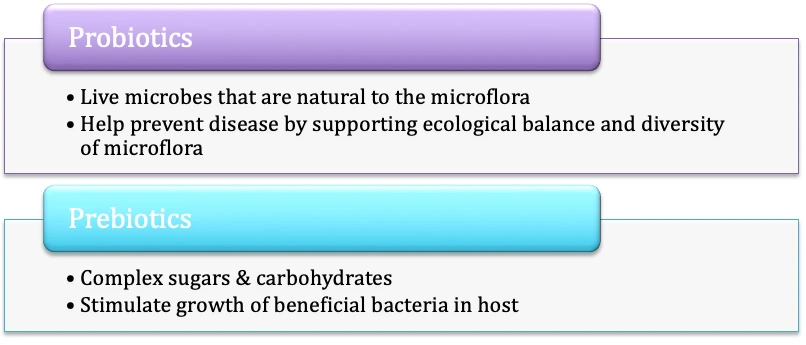The Oral Microbiome & Systemic Disease
Course Number: 561
Course Contents
Prevention
If at all possible, it is beneficial to maintain health and prevent disease in the oral cavity before it begins. It has been suggested that the use of probiotics, or live microbes that are natural to the microflora, can help prevent disease by introducing beneficial bacteria that support “ecological balance” or increase the biodiversity of the microflora.7,30 For instance, people with high levels of Capnocytophaga ochracea had lower amounts of P. gingivalis and vice versa. Therefore, a patient with elevated levels of P. gingivalis may be given C. ochracea as a preventive measure before periodontal disease begins.30 Prebiotics, on the other hand, are complex sugars intended to stimulate additional growth of beneficial bacteria within the host (Figure 5). It is important to note that the effects of probiotics on the host are not well established as many of the studies have been conducted in vitro.30 Thus, caution in recommending their use is advised.
Saliva is another important component in disease prevention. Saliva contains nutrients and antibodies, which act as a very important protective factor for the oral cavity by helping to maintain homeostasis and providing protection from disease.30 In healthy environments, microorganisms can prevent disease from progressing in the following ways: 1) preventing adherence of pathogens by occupying their preferred site, 2) actively blocking pathogens from adhering, 3) decreasing the pathogen’s ability to multiply, and 4) diminishing the virulence of the pathogen.30 However, when an ecological shift occurs due to poor oral hygiene, genetics, and/or a compromised immune system, it is possible for the disease process to begin. Therefore, maintaining good oral hygiene is critical, because it is one of the few things patients can control when it comes to disease prevention. Ultimately, the only way to maintain a healthy microbiome is through good oral hygiene and an immune system that is functioning properly.30
When considering ways to support the immune system and defend against disease, there are positive benefits to maintaining a healthy body weight. Factors that accompany obesity, such as oxidative stress and inflammation, increase risk factors for disease.59 Research evaluating the relationship between periodontal disease and obesity suggests that individuals with a BMI > 30 are at three times greater risk of developing periodontitis.60 Interestingly, patients who received gastric bypass surgery demonstrated a reduction in periodontopathogenic bacteria and select inflammatory biomarkers; however, periodontal conditions did not improve after significant weight loss.61 This suggests that weight loss alone may not be sufficient for helping improve periodontal status. However, due to the risks associated with obesity and periodontal disease, dental professionals can utilize nonsurgical periodontal therapy and antimicrobials to help control oral pathogens.59


